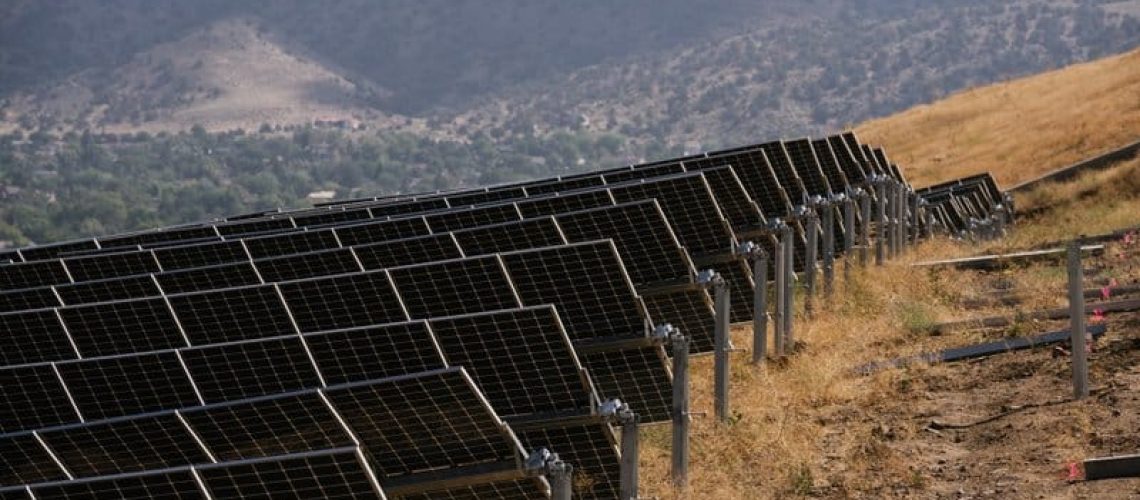A construction analysis and consulting firm found that the Nevados tracker requires only 118 person-hours per megawatt, lower than other comparable solar trackers.
According on a new report from Eclipse-M, an independent technical consultant for solar project construction, the Nevados All Terrain solar tracker can be assembled and installed faster than any tracker in its class. The firm reported that other solar trackers require between 159 to 244 work hours per megawatt compared to 118 for Nevados.
The All Terrain Tracker’s adaptability allows tracker bays to follow the natural terrain, eliminating the need for extensive site grading to install the tracker. This keeps the topsoil in place and prevents harmful runoff by maintaining the land’s natural permeability. It also reduces construction time due to the grading process itself and the resulting muddy conditions which can slow down tracker assembly.
Nevados has found that the same flexible tolerances that allow its tracker to navigate terrain and eliminate grading also allow for efficient installation times.
“Along with the terrain-following benefits that you’ll see from Nevados, we’re not seeing a penalty in terms of installation, which is good news,” said Bill Poulin, managing partner of Eclipse-M, who presented his findings at the CLEANPOWER conference and trade show in Minneapolis. “We really think that terrain following is an important new development in tracker design and methodology, so it’s good to see that can be achieved.”
Eclipse-M is a third-party services and consulting provider for the solar industry, with decades of experience executing projects in close consultation with developers and OEMs. It has aided in the development and execution of projects using 14 leading tracker and fix-tilt assemblies, providing the company unique insights into the factors driving construction time.
“Nevados is a customer-focused company, so we’re always working with our partners to improve our products and processes to ensure our tracker can be constructed quickly and precisely,” said Yezin Taha, CEO and founder of Nevados.
For their report, Eclipse-M looked at a range of factors affecting install rates under normalized conditions such as the same module wattage for each tracker, including:
- Physical work of installing the tracker
- Material handling requirements to unpack the tracker
- Site preparation requirements, including grading
- Materials and logistics to get the tracker to the site
In looking at the amount of physical work going into tracker installation, Eclipse-M analyzed the structure’s complexity, number of components, as well as the product’s tolerances and the required precision for construction. They also looked at the drive and mounting systems, as well as the module attachment (whether using bolts/nuts or clamps).
Even the most accurate site surveys won’t be 100% accurate, so broad tolerances are key. Nevados uses flexible bearings at each foundation. Even when pilings are not exactly where they are expected to be, the All Terrain Tracker can easily adjust with no re-work.
At the Bartonsville solar plant in Virginia, the developer needed to switch panel manufacturers late in the project’s development because of supply chain issues. The new panels used had different points of connection and had different dimensions from the original panels.
It was easy to make that change using the more flexible Nevados system, whereas other trackers would have required moving hundreds of foundation pilings across many acres of trackers, and could require an entirely new torque tube assembly to adjust to this change.
Nevados also works closely with EPCs to optimize material handling, cutting preparation time. Through detailed post project reviews with customers, Nevados learned that changes in how components for the All Terrain Tracker arrived on site could create installation time improvements for customers. Now, some components will arrive preassembled while others that previously did, will arrive disassembled.
Nevados uses American steel for its trackers, rather than aluminum, cutting out long and volatile global supply chains. Tracker components are fabricated by Priefert Steel in Mount Pleasant, Texas, a central location to allow easy shipping to sites across the United States.



